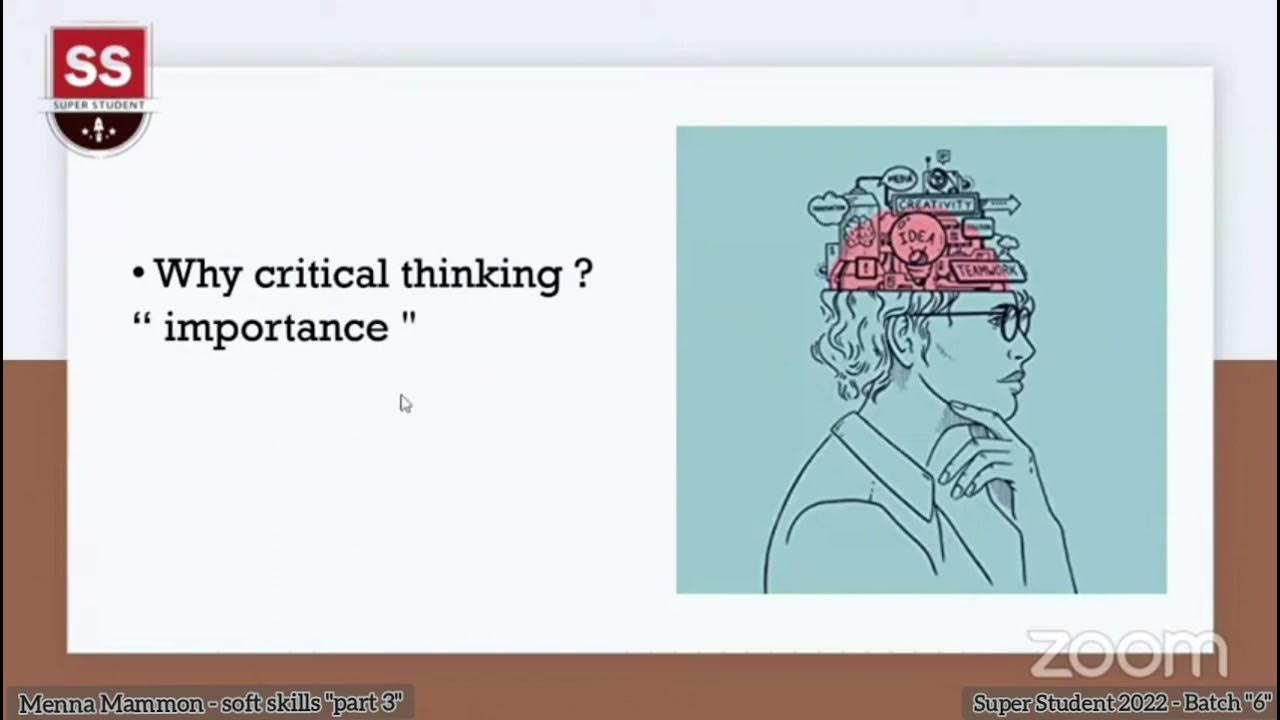CIRI-CIRI ORANG YANG BERPIKIR KRITIS | Dr. Fahruddin Faiz | Ngaji Filsafat
Summary
TLDRThe script discusses the competencies of critical thinking, emphasizing the importance of using accurate data, organizing thoughts clearly, distinguishing between logical and illogical ideas, and evaluating the sufficiency of evidence. It also highlights the need to question assumptions, recognize one's own fallibility, and understand the application of knowledge in real-life situations. The speaker encourages self-reflection and continuous practice in critical thinking as essential for personal and academic growth.
Takeaways
- 🧠 Critical thinking involves using facts and data accurately and honestly, ensuring relevance and truthfulness without manipulation.
- 🗣️ A critical thinker can organize thoughts and express them clearly, logically, and reasonably.
- ⚖️ Critical thinkers can distinguish between logical, valid thoughts and those that are not, often hindered by biases or personal ambitions.
- 🔍 A critical thinker can identify whether the available data is sufficient to support a given argument or conclusion.
- 🚫 Critical thinkers can refute irrelevant arguments and present relevant ones, ensuring they are appropriate to the current situation.
- ❓ Critical thinking includes questioning and challenging viewpoints, including the implications of those viewpoints.
- 🤔 Critical thinkers are aware of their own limitations, recognizing they can be wrong and are open to correction.
- 🧐 The process of critical thinking begins with assumptions, which can be analyzed and critiqued to understand the basis of a viewpoint.
- 🔄 Experience, knowledge, comprehension, application, analysis, synthesis, and evaluation are all parts of the critical thinking process, where each stage can be critically examined.
- 🔧 Application and adaptation of understanding in real-world scenarios often require adjustments, which can be critically evaluated for relevance and accuracy.
Q & A
What are the characteristics of a critical thinker according to the speaker?
-A critical thinker is someone who can use facts and data accurately and honestly, organize thoughts clearly and logically, distinguish between valid and invalid reasoning, identify sufficient data for arguments, refute irrelevant arguments, question views and their implications, and recognize their own potential for error.
Why is honesty important in critical thinking?
-Honesty is crucial in critical thinking because it ensures that data and facts are used accurately and truthfully, preventing manipulation and preserving the integrity of reasoning.
How does the speaker define the ability to organize thoughts?
-The ability to organize thoughts involves clearly and logically expressing ideas, making it easy to understand and follow the reasoning behind them.
What does the speaker mean by 'sufficient data' in critical thinking?
-Sufficient data refers to having enough relevant and reliable information to support a conclusion or argument. A critical thinker should be able to determine if the data available is adequate for making informed decisions.
How can personal biases affect critical thinking?
-Personal biases, such as ambitions or idols, can cloud judgment, making it difficult to distinguish between logical and illogical reasoning, thus hindering critical thinking.
What role does questioning play in critical thinking?
-Questioning allows a critical thinker to challenge assumptions, views, and their implications, leading to deeper understanding and preventing superficial conclusions.
How does the speaker view the relationship between critical thinking and self-awareness?
-The speaker emphasizes that self-awareness is a key aspect of critical thinking. A critical thinker recognizes their limitations, understands that they can be wrong, and is open to correction.
What is the significance of 'application' in the critical thinking process?
-Application is the stage where theoretical knowledge and understanding are put into practice. It involves adapting concepts to real-world situations, which often requires critical analysis to ensure relevance and effectiveness.
Why is evaluation important in critical thinking?
-Evaluation is important because it involves reassessing conclusions and processes to ensure they are accurate, relevant, and appropriate. It helps identify any gaps or errors in reasoning that need to be addressed.
How can assumptions impact the process of critical thinking?
-Assumptions can shape how we perceive and understand information. Critically evaluating these assumptions is essential to ensure they are valid, as they can significantly influence the conclusions we draw.
Outlines

This section is available to paid users only. Please upgrade to access this part.
Upgrade NowMindmap

This section is available to paid users only. Please upgrade to access this part.
Upgrade NowKeywords

This section is available to paid users only. Please upgrade to access this part.
Upgrade NowHighlights

This section is available to paid users only. Please upgrade to access this part.
Upgrade NowTranscripts

This section is available to paid users only. Please upgrade to access this part.
Upgrade NowBrowse More Related Video

7.3 ازاي استفيد من التفكير النقدي

Pra LDK - (3) Berpikir Kritis

Critical thinking and reading

BAB 3. PART 1 BERPIKIR KRITIS DAN DAMPAK SOSIAL INFORMATIKA. PENGANTAR BERPIKIR KRITIS. FASE F SMA.

Video Pembelajaran Karya Tulis Ilmiah - Nurhannah Widianti (UIN Siber Syekh Nurjati Cirebon)

Critical Thinking #5: Necessary & Sufficient Conditions
5.0 / 5 (0 votes)